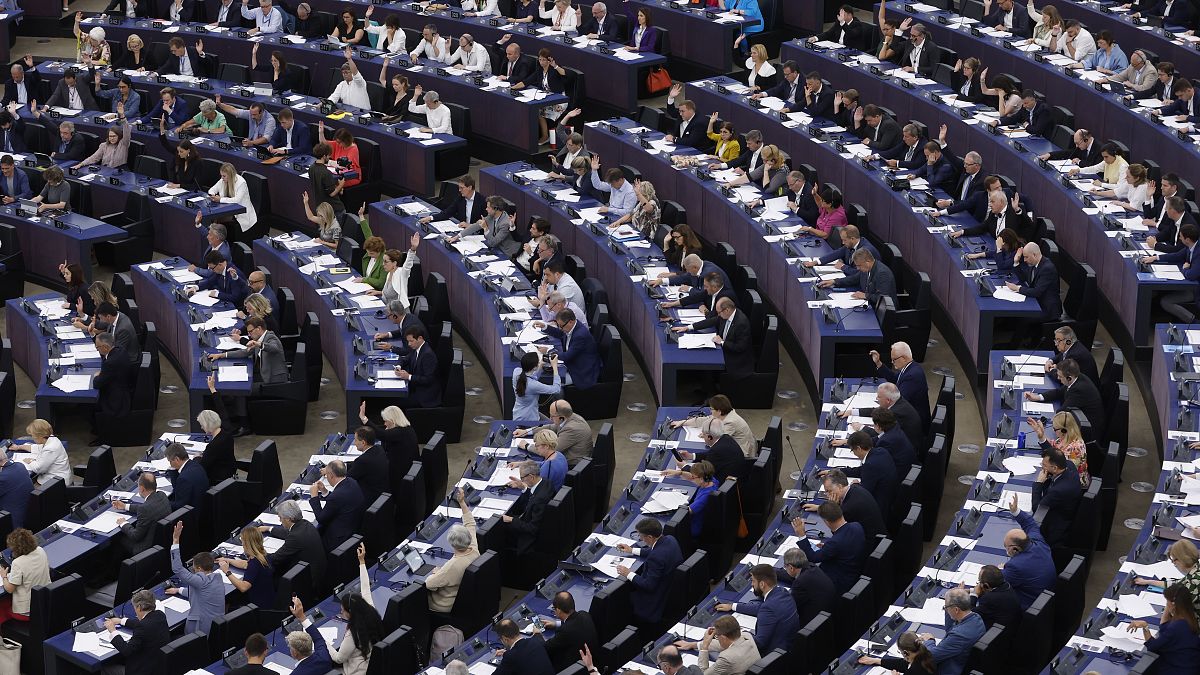Which key tech lawmakers will stay in Brussels?

We’ve listed the most influential incoming and outgoing members of the EU Parliament on digital issues.
With about a month to go until the European Parliament election in June, some of the most productive, outspoken or visible tech lawmakers are hoping to be re-elected for another five-year mandate. We’ve been looking at which key decision-makers on files such as the AI Act, cybersecurity and platform regulation are on the list, as well as those bidding farewell to Brussels.
Up for re-election:
Brando Benifei (Italy/S&D)
Brando Benifei is Italy’s half of the AI Act duo, together with Romania’s Dragos Tudorache. Benfei, who was elected an EU lawmaker at the age of 28 in 2014, has not only co-led the Parliament’s efforts on the AI Act but also dealt with topics like toy safety and the single market. He has hinted several times about the work on AI that needs to be done in the next mandate; carrying on with rules on AI and the workplace for example.
Axel Voss (Germany/EPP)
Axel Voss entered Parliament in 2009 becoming one of Germany’s most prominent lawmakers on tech. Voss is a member of the Legal Affairs Committee and steered through files including the AI Act. In the previous mandate he played a key role in copyright reform and the EU’s pioneering General Data Protection Regulation (GDPR). For the next mandate, Voss has called for reform of data rules as well as future-proof laws. He’s placed fifth on the Christian-Democrat list of the German region of North Rhein-Westphalia.
Birgit Sippel (Germany/S&D)
Most people remember Birgit Sippel, who has been in Parliament since 2009, for her fight for e-privacy, e-evidence and Child Sexual Abuse Material (CSAM) as well as for her involvement on migration issues. She’s placed fifth her party’s list, increasing the likelihood of her staying in Brussels.
Eva Maydell (Bulgaria/EPP)
One of the best-known lawmakers on tech files such as the Chips Act, AI and data rules, Bulgarian Eva Maydell has been making waves since, at 28-years old, she entered Parliament in 2014 as the youngest lawmaker in the Christian-Democrat EPP group.
Kim van Sparrentak (the Netherlands/Greens-EFA)
Kim van Sparrentak, who was elected with preference votes as an EU lawmaker in 2019, is fourth on the joint Dutch Labour-Greens list, almost guaranteeing that she will secure another term. Van Sparrentak steered through files on addictive design and consumer protection and focused on topics such as AI and labour rights. She said on her party website that she wants to continue fighting for a human approach to technology in the next mandate.
Incoming candidates:
Luukas Ilves (Estonia/Renew)
An interesting newcomer, if elected, will be Luukas Ilves, most recently the deputy secretary general for digital development at the Estonian Ministry of Economic Affairs and Communications. He has held jobs at the country’s Defence Ministry, the permanent representation in Brussels and worked as Estonia’s Chief Information Officer, following technology topics. He is the son of Toomas Hendrik Ilves, also an MEP between 2004 to 2006, who left the job to become President of Estonia, often cited as Europe’s most digitised state. Luukas Ilves said the EU needs to catch up with the US and China when it comes to AI, at the time of announcing his candidacy for the liberal Reform Party.
Running again:
Influential AI lawmaker Svenja Hahn (Germany/Renew) is also planning to run again, as is Malta’s Alex Agius Saliba (S&D) who worked on the same file. Marcel Kolaja (Czechia/Greens-EFA) and Christel Schaldemose (Denmark/S&D) are also on their national lists.
The Netherlands’ key lawmaker on cybersecurity files Bart Groothuis (Renew) has confirmed he is available for another mandate, while Sophie in ‘t Veld (the Netherlands/Renew), who played a high-profile role on spyware, has left the Dutch D66 party to join Volt, for which she is hoping to get elected in Belgium to continue her two-decade mandate. The party advocates the establishment of an EU-level ministry of digitalisation.
Leavers:
Among departing lawmakers are Miapetra Kumpula-Natri (Finland/S&D) and Paul Tang (Netherlands/S&D) – who followed issues such as the Digital Services Act and tax evasion. Deirdre Clune (Ireland/EPP), who was involved in the AI Act, and Karen Melchior (Denmark/Renew) who contributed to the Parliament’s position on geo-blocking, do not appear on their respective lists.
Dragoş Tudorache (Romania/Renew), the Parliament’s co-lead on the AI Act is also leaving, although he may continue his work on AI as he’s been mooted as a candidate to head up the new EU AI Office. Dita Charanzová (Czechia/Renew), currently a vice-president and influential in the Parliament’s Internal Market committee, said she will not be on the list for ANO, the party of former prime minister Andrej Babiš. Whether she will run for another party, remains to be seen.
Related
Europe Is in Danger of Regulating Its Tech Market Out…
In June, Apple announced a new product called Apple Intelligence. It’s being sold as a new suite of features for the iPhone, iPad, and Mac that will us
€70M for circular fashion, €100M fund for CEE startups, and…
This week we tracked more than 65 tech funding deals worth over €685 million, and over 5 exits, M&A transactions, rumours, and related news stories acros
The Berlin-based startup school whose teaching methods date back to…
"I was a small town kid from the south of Germany from a working class family,” says Fabian Kamberi, the co-founder of social gaming startup SLAY. “CODE op
Primary Portal secures £7.5M first stage Series A funding for…
Primary Portal, a digital platform that aggregates and digitises equity capital market processes for banks and asset managers, has completed the first stage of











